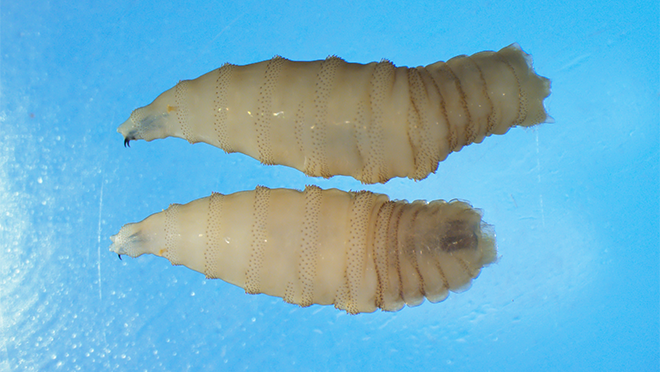Key points
- Myiasis is a parasitic infection of fly larvae (maggots) in human tissue.
- New World screwworm (NWS) is a species of parasitic worms that can cause myiasis and feed on live tissue.
- It primarily affects livestock, but it can, rarely, infest people.
- NWS is typically found in South America and the Caribbean.
- You are at higher risk for NWS if you travel in these areas, are around livestock in rural areas where the flies are, and if you have an open wound.

Overview
New World screwworm (NWS) infestation occurs when NWS fly larvae (Cochliomyia hominivorax) infest the tissue or flesh of warm-blooded animals; on rare occasions this includes people. Screwworm flies are attracted to and lay eggs on and in open wounds. NWS does not regularly occur or spread in the United States. The parasite is typically found in South America and the Caribbean. People who travel to these areas, spend time among livestock animals, sleep outdoors, and have an open wound are at greater risk of becoming infested with NWS.
Symptoms
NWS infestations are very painful. If you have an NWS infestation, you may see maggots (larvae) around or in an open wound. They could also be in your nose, eyes, or mouth. Tell your healthcare provider of any recent travel to Central or South America, or the Caribbean.
Symptoms can also include
- Unexplained skin lesions (wounds or sores) that do not heal.
- Skin wounds or sores that worsen over time.
- Painful skin wounds or sores.
- Bleeding from open sores.
- Feeling larvae movement within a skin wound or sore, nose, mouth, or eyes.
- Seeing maggots around or in open sores.
- A foul-smelling odor from the site of the infestation.
Secondary bacterial infections sometimes occur and may cause fever or chills.
Keep Reading
Risk factors
You may be at an increased risk for NWS if you travel to areas where the flies are present and
- Have an open wound, from a scratch or cut, from an insect bite, or from a recent surgery.
- Have a weakened immune system, for example from HIV, cancer treatment, or medications that weaken your immune system.
- Have a medical condition that can cause bleeding or open sores, such as from skin or sinus cancer.
- Sleep outdoors.
If you live, work, or spend an extended amount of time with (or near) livestock or other warm-blooded animals in these areas, you could also be at a higher risk for NWS.
How it spreads
New World screwworm infestations begin when a female fly lays eggs on open wounds or other parts of the body in live, warm-blooded animals. In rare occasions, this can happen in birds and people. The smell of a wound or an opening such as the nose, mouth, or eyes, umbilical cord of a newborn animal, or genitals, will attract the female flies. Wounds as small as a tick bite may attract a female fly to feed and lay her eggs. One female can lay 200 – 300 eggs at a time and may lay up to 3,000 eggs during her 10- to 30-day lifespan.
Eggs hatch into larvae (maggots) that burrow into the wound to feed on the living flesh. After feeding, larvae drop to the ground, burrow into the soil, and emerge as adult screwworm flies.
Prevention
Prevention is key to protecting yourself from myiasis. Prevent insect bites, especially when visiting tropical areas and spending time outdoors, and
- Keep open wounds clean and covered.
- Wear loose-fitting, long-sleeved shirts and pants, and socks to limit areas where you could get bitten.
- Use an EPA-registered insect repellent.
- Treat clothing and gear with products containing 0.5% permethrin.
- Sleep indoors or in rooms with screens.
Treatment
If you see or feel maggots (larvae) in or on a wound or other area of your body, contact your healthcare provider immediately. They will need to remove the larvae, sometimes through surgery. Do not try to remove or dispose of the maggots yourself.
Reminder
If you are a healthcare provider removing larvae from a patient, place all larvae directly into 70% ethanol (or other alcohol) and contact CDC's DPDx lab for specimen submission instructions.
If you think your patient has NWS, report it immediately to your local or state health department. Veterinarians should report any suspicious cases immediately to their state animal health official and APHIS office.
Resources
- New World screwworm - USDA
- New World screwworm: What You Need to Know (English and Spanish)
- New World screwworm Story Map
- Screwworm: An International Threat to Human and Animal Health
